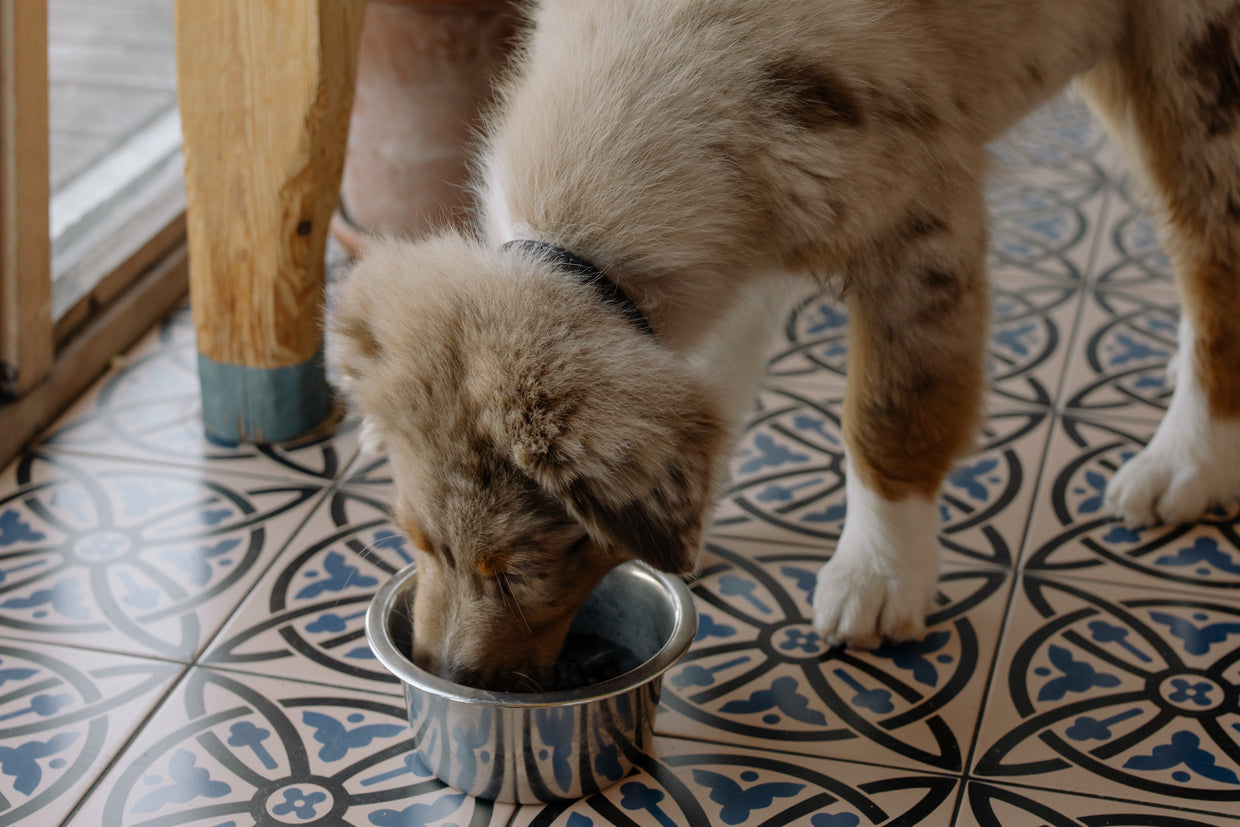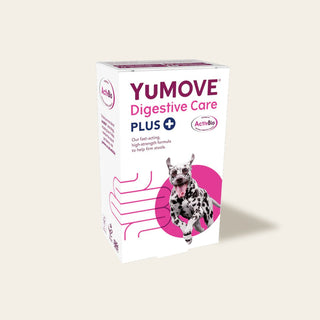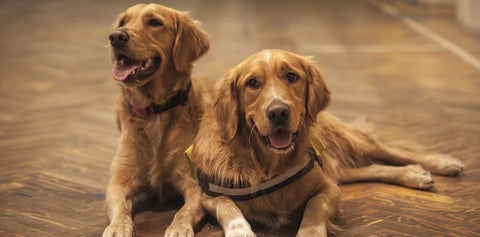

Keeping Mealtimes Safe: What Dogs Can and Can’t Eat
Visualise this: it’s dinner time. You’re sitting enjoying your meal. A special four-pawed someone appears and starts giving you the most heart-melting look you’ve ever seen. Now he’s starting to whine and whimper. Do you give in?
Every pet owner feels the temptation to give their dog the occasional forbidden treat off their own plate. But if you don’t know how to identify poisonous foods for dogs, or spot food poisoning symptoms for dogs, this indulgent habit could end up doing real harm.
In this informative guide, we aim to give you a comprehensive rundown of topics ranging from the most poisonous foods for dogs, to what to do if your dog eats something poisonous.
First things first… is all ‘people food’ off limits?
You might have heard that it’s best to avoid giving your dog any ‘people food’. But while this guideline can keep your dog safe from some of the morsels that are most dangerous to them, it’s also a misleading standard – since plenty of the things we enjoy eating are also totally fine for our dogs.
Various fresh fruits and vegetables, as well as lean meats, are safe to feed to your dog. But if you’re at all unsure of whether a particular food makes the cut, it’s best to err on the side of caution and avoid sharing it with them.
One thing that often makes ‘human food’ tricky for dogs, is the fact that our meals tend to include a wide range of ingredients. It might be that the biggest and most visible ingredients in a stew, for example, could be fine for your dog to eat. But if that same stew contains garlic and onion, you’d need to steer well clear of dishing up a canine-sized portion.
So, should you avoid giving your dog ‘people food’? Not exactly, but it’s still a good general rule of thumb to follow – especially if you’re not an expert on canine nutrition.
What foods can’t my dog eat?
When it comes to the foods that your dog can’t eat, there’s a wide range to be aware of. The most poisonous food for dogs can be fatal in only a short space of time. Other foodstuffs, though, only become a problem when eaten in higher quantities. Then, there are also some foods which might be fine for some dogs to eat, but which might cause an upset stomach for others.
Here’s a look at some of the foods that you need to completely avoid feeding your dog, as well as those that you need to be cautious of.

Completely off limits
Chocolate
Chocolate is easily one of the most well-known poisonous foods for dogs, and it should never find its way to your pet’s plate. Although for humans, chocolate is a delicious (although sometimes guilty) treat that can be used to celebrate holidays or to wrap up a fine meal, for dogs it’s a potent toxin.
Chocolate contains substances called methylxanthines, including the stimulant theobromine which is highest in dark chocolate and cocoa powder. Even a small bite of chocolate can cause your dog to experience diarrhoea and vomiting. Larger amounts can cause seizures, irregular heart function, and even, sadly, death.
In fact, chocolate is such a health hazard for dogs, that you should take extra steps to ensure it’s not kept anywhere that your four-pawed pal could reach.
Garlic
While garlic is a health superfood for humans, the same unfortunately isn’t true for dogs. Garlic is a member of the allium family, alongside onions and leeks. All of these are toxic to dogs as they contain thiosulfate, which can cause damage to a dog’s red blood cells. This can result in anaemia, rapid breathing, weakness, fatigue, loss of appetite, depression, abdominal pain, and more.
The good news is that your dog would need to eat a lot of garlic to be in real trouble. In fact, research suggests that it takes about 15-30 grams of garlic per kilogram of body weight to cause harmful changes in a dog’s blood. Still, some dogs are more sensitive to garlic than others and may experience side effects sooner. The best policy here is to exclude members of the allium family from your dog’s diet.
Macadamia nuts
Macadamia nuts are known to be poisonous to dogs, and can cause a variety of unpleasant side effects, including vomiting, weakness, difficulty walking, and elevated body temperature.
Symptoms are usually mild and clear up by themselves, and your dog likely won’t want to gorge themselves on macadamia nuts after the first mouthful. Nonetheless, if they’re mixed into other foods, there’s a heightened risk of your dog consuming a large dose and dealing with severe side effects that might require medication and sometimes hospitalisation.
Caffeine
It’s a little-known fact that caffeine is toxic to humans, as well as to other living creatures. It’s just that we need to consume quite a lot of it to experience serious caffeine poisoning. For people who really overdo it on caffeine pills and energy drinks, though, the results could be fatal.
Dogs have the same basic reactions to caffeine as we do, but they experience those effects at significantly lower doses. What’s more, the size of the dog influences how much a dose of caffeine will impact them. Unfortunately, just one or two caffeine pills’ worth of the substance could prove fatal to a small dog.
Dogs experiencing caffeine poisoning will likely appear very anxious and restless, may experience vomiting and diarrhoea and may exhibit tremors, shakes, and potentially even seizures.
The moral of the story here is that you should let your dog greet the day the natural way and keep that cup of mocha well out of reach.
Xylitol
Xylitol is natural sweetener that’s added to various processed foods and other products. It can be found in chewing gum, sauces, some peanut butters and spreads, toothpaste, mouthwash and more. Unfortunately, while xylitol can help humans to cut down on their sugar intake and improve their oral health, it’s highly toxic to dogs.
When your dog eats xylitol, their pancreas is tricked into releasing a spike of insulin to deal with the ‘sugar’ that it thinks is coming. This causes blood sugar levels to fall, which can lead to your dog feeling weak, vomiting, and experiencing diarrhoea. Xylitol ingestion can even cause loss of coordination, liver failure and death, and even a small amount can be fatal.
Add sweetness to your dog’s life with extra cuddles and the occasional vet-approved treat – never with xylitol.
Grapes, raisins, and sultanas
Grapes, raisins, and sultanas are all potentially toxic to dogs, and can cause an upset stomach and kidney problems. They can even end up resulting in kidney failure. Just why this happens isn’t entirely clear, and not all dogs are equally affected. Either way, you should keep these foods well away from your canine friend just in case.
Exercise caution
Cinnamon
Cinnamon isn’t actually toxic to dogs, and if your dog happens to eat a small amount of it, they’ll likely be just fine. In higher quantities, though, cinnamon can cause your dog’s blood sugar levels to fall and may lead to unpleasant side effects like diarrhoea, vomiting, and irritation of the mouth. When it comes to this savoury spice, it’s wise to exercise caution.
Almonds
Unlike macadamia nuts, almonds aren’t directly toxic to your dog – but that doesn’t mean they aren’t potentially dangerous. The shape and consistency of almonds means they can cut the inside of your dog’s mouth and oesophagus, and may be a choking hazard. Almonds – like all nuts – are also high in fat and can cause dogs to experience digestive difficulties and discomfort. If your dog happens to eat a small amount of ground almonds as part of a snack, they’ll likely be alright. All in all, though, best to avoid.
Dairy products
While it’s generally alright for dogs to have small amounts of milk or cream – such as the famous Starbucks ‘Puppucino’ (aka whipped cream in a dog-sized cup) – it’s best for them not to have too much. Many dogs are actually lactose intolerant, just like many humans are. That means dairy products can trigger diarrhoea, gas, and other digestive issues.
Bread
Plain, white bread is safe for your dog to eat in small quantities, but it also offers very little in the way of nutritional value. The excess calories from bread need to be taken into account to prevent your dog’s weight from creeping up, and you also need to be mindful not to feed your dog bigger pieces that could be a choking hazard.
Ok, so what ‘people food’ can my dog actually eat?
After looking at the list of foods your dog should never touch (and a few they should be nervous about), you might be wondering if there’s actually anything from your next dinner party or BBQ that you might be able to share with your fluffy companion.
Fortunately, there are a good number of ‘people foods’ that your dog can eat with no trouble. These include the following:
Cashew nuts
Unlike some other nut varieties, cashews are fine to feed your dog in moderation. Ideally, just a few at a time, though.
Eggs (when fully cooked)
Fully cooked eggs (minus the shell) are a healthy food for your dog to enjoy, and are rich in helpful nutrients. Just don’t feed your dog raw eggs, as these have been implicated in potential health issues.
Cooked fish (minus the bones)
Fish is a healthy food for dogs, and contains a balance of amino acids, good fats, and vitamins. Just be sure that you don’t feed your dog raw fish (as this can contain parasites or result in food poisoning). Also be sure to remove any hard or sharp bones.
Honey
Honey is a healthy treat to feed your dog in small quantities. Not only is it packed with nutrients, but the pollen it contains can even help your dog’s immunity to allergens.
Peanut butter (xylitol-free versions only)
Peanut butter is fine for your dog to eat in moderation. It contains a decent range of nutrients, and there’s a good chance that your pup will really enjoy it. It is high in calories, though – so don’t get too carried away. For health reasons, it’s best to feed your dog raw, unsalted peanut butter. Just be absolutely certain that any peanut butter you feed your canine companion doesn’t contain xylitol. Xylitol is a real contender for the most poisonous food for dogs, and it’s sometimes added to peanut butter.
Quinoa
Washed quinoa is a safe and healthy food to give your dog. It’s rich in nutrients and mixes well with other ingredients to form a dog-friendly porridge or stew.
Wholegrains
Wheat, barley, buckwheat, and other wholegrains are healthy foods for your dog to eat. They contain fibre, essential fatty acids, and other key nutrients.
Lean meats
While you should avoid giving your dog any fatty cuts of meat, lean meats are a perfectly dog-friendly morsel. Just be sure to remove any bones in advance, and a barbecued piece of chicken will leave your pup feeling over the moon.
Carrots
Chopped up carrots can be a fun and healthy snack for dogs. A lot of dogs will enjoy carrots, and they have the added benefit of being low-calorie treats. Just be sure to chop them up enough to avoid any choking risks.
What should I do if my dog has an upset stomach?

It can be difficult to know what to do if your dog eats something poisonous, but the general rule of thumb is that if you notice you pup eating anything of concern, you should call your vet. Similarly, if you notice any serious side effects – including ongoing diarrhoea, vomiting, shakes or any others we’ve mentioned above – this should warrant a visit to your vet without hesitation.
It might be the case, though, that your dog hasn’t eaten anything that’s obviously toxic, but that they seem to have a sensitive digestive system for no clear reason. That’s where a powerful dog digestive care supplement like YuMOVE Digestive Care can help, with ingredients that support digestive health by topping up good gut bacteria, while blocking the bad. For higher strength, fast-acting support, consider YuMOVE Digestive Care PLUS – which contains three different types of prebiotics, and over one billion probiotic bacteria per sachet, to ensure a healthy digestive balance.
Does your dog experience sensitive digestion? Are you on the lookout for ways to make mealtime less of an obstacle course? If so, consider giving them YuMOVE Digestive Care or YuMOVE Digestive Care PLUS, to support their overall digestive health while topping up good gut bacteria, and blocking bad bacteria.




